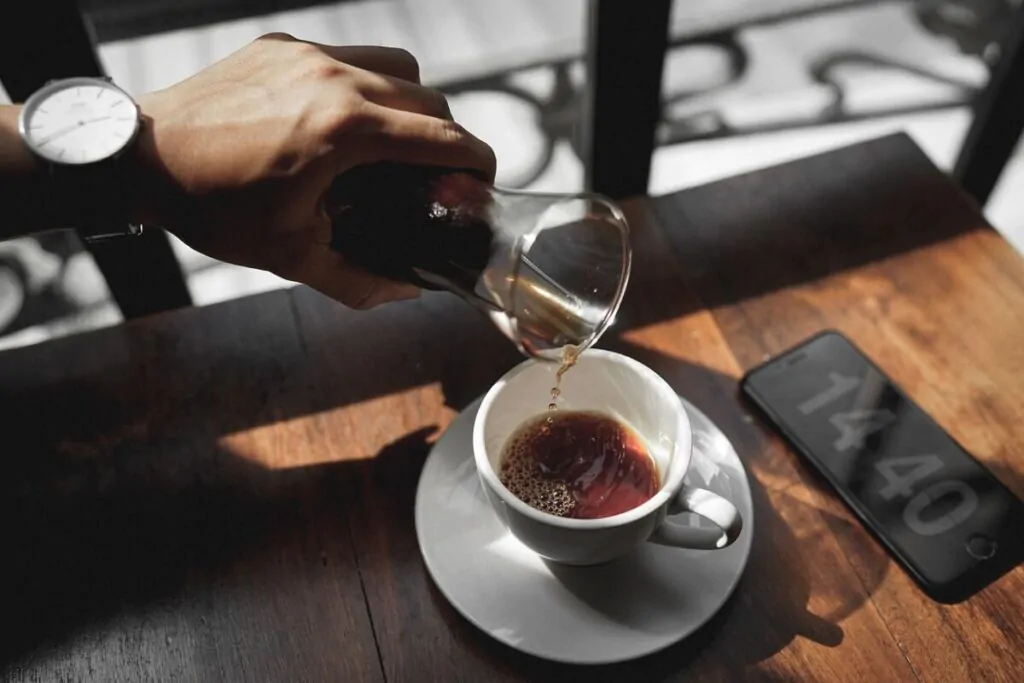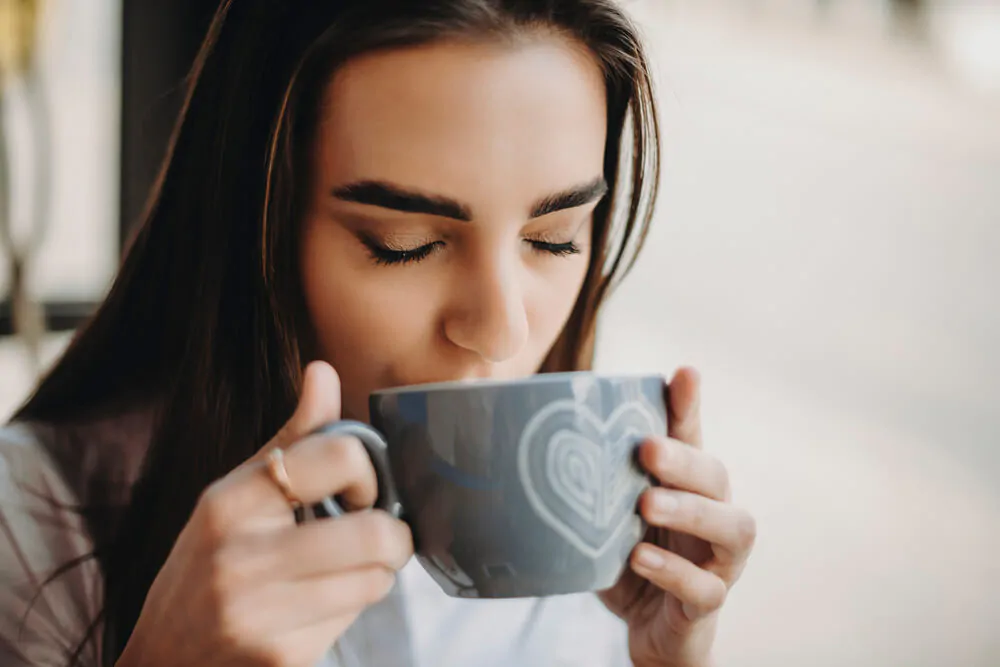Coffee lovers know the health benefits of caffeine. What about its downside? Here, we explore “what is microdosing caffeine” and its effect on the body.

Are you like me, who drinks my cup of Joe to stay awake the entire day because I don’t have a regular working schedule? While I’m aware that anything consumed in excess is bad, I didn’t know that too much caffeine makes you more sleepy. That explains why drinking coffee doesn’t make me as alert as it used to!
With this in mind, I looked for another solution to stay awake– that’s when I found out all about microdosing caffeine. It’s a practice of consuming little amounts of caffeine than the standard dose throughout the day.
This article will discuss caffeine and microdosing to help you understand and see if you should try it.
What Is Microdosing Caffeine All About?

Microdosing’s original definition was “a phenomenon that involves taking about one-tenth or a one-twentieth dose of psychedelic hallucinogens and/or other drugs.” But medical experts redefined it as a small dose of a substance that will not cause any intoxication or significant change of consciousness. Some of the substances that can be microdose are LSD, psilocybin mushrooms, cannabis, MDMA, methylphenidate, and nicotine.
But why is caffeine a part of this lineup?
It’s because caffeine is the drug most commonly used in the world. Along with alcohol and nicotine, caffeine is a psychoactive substance that affects the same parts of a person’s brain as cocaine. However, coffee lovers focus more on caffeine as a stimulant with health benefits since everyone responds to these substances differently.
The difference between microdosing and regular caffeine consumption is its effect on someone. For example, an individual who drinks coffee in the morning will experience a boost in energy until it eventually fades away after a few hours, so they’ll need to get another cup for the rest of the day. On the other hand, microdosing your caffeine allows you to prevent energy changes by staying in a consistent state of subtle alertness.
The Right Dosage Of Caffeine And Its Benefits
Medical experts say a person’s maximum caffeine intake a day is 400mg and the ideal range is only between 50 to 100 milligrams. While caffeine helps energize, improve cognition, and lower the risk of diseases like cancer, dementia, and Type 2 diabetes, they do not recommend taking 400mg of caffeine daily. Some people experience headaches, anxiety, high blood pressure, abnormal heart rate, and insomnia if they consume about 140mg of caffeine.
If you’re not sure of your ideal caffeine range, microdosing is an excellent technique to figure it out. Find out how long it takes for caffeine to kick in and lose its effects on your body. Caffeine kicks in after 15 to 45 minutes, depending on metabolism and what you have already consumed.
The effects of caffeine depend on the amount of caffeine consumed, but its half-life lasts up to five hours. By drinking small doses of caffeinated beverages, you can:
- Measure how long before the effect wears off
- How sensitive you are to caffeine
After that, you can start developing a microdosing regimen that will keep you in a healthier range.
Caffeine Content Of Each Beverage
Do you know how many milligrams of caffeine is in a cup of coffee? Aside from coffee, here is a list of the caffeine content of popular caffeinated drinks for an eight-oz serving.
- Matcha tea – 19 – 44 mg
- Soda – 22 mg
- Green tea – 28 mg
- Black tea – 47 mg
- Espresso – 64 mg
- Energy drink – 70 – 80 mg
- Coffee – 96 mg
Effects Of Lowering Your Caffeine Doses
Whether it is higher or lower than 100mg of caffeine, it is still the same substance, so the health benefits are the same. However, taking smaller amounts of caffeine is safer and healthier.
Reducing the total amount of caffeine consumed in a day gives way to these health benefits:
- Improves concentration, alertness, and mindfulness
- Increases alertness to avoid drowsiness and unplanned naps
- Lowers blood pressure
- Improves mental health by reducing stress and anxiety and relieving symptoms of depression
- Avoids triggering an upset stomach or ulcer because of its lower acid level
- Improves collagen synthesis resulting in healthier skin
- Reduces stomach acid, sugar, and calorie intake
- Boosts a person’s energy, mood, optimism, and social skills
- Helps people quit other harmful habits like smoking and drinking alcohol as they feel that they do not need stimulants like coffee anymore
- Self-efficacy benefits include productivity, cognitive skills, and creativity
Microdosing Caffeine: Drawbacks And Cautions
Microdosing caffeine is beneficial, but experts have a few reminders for those who want to try it.
Caffeine Withdrawal
When someone who regularly consumes caffeine abruptly stops, they can experience fatigue, irritability, anxiety, and migraines.
Accurate Labels
Medical professionals always remind their patients to check the labels of their coffee or teas to ensure that they are all-natural. Today, many brands slap the word “natural” or “organic” on their product, but in reality, these goods aren’t. All-natural products are prized as they are minimally processed to avoid fundamentally changing the composition of their contents.
Proper Consultation
Consult your doctor before trying anything new that involves your health, such as microdosing caffeine—especially for those who consume more than 200mg of caffeine, people with comorbidities, and pregnant women.
How To Microdose Caffeine

Microdosing caffeine is simply reducing your caffeine intake by consuming it slowly. Here are some tips you can use in microdosing caffeine:
- Experiment with your coffee grounds and brew a semi caffeinated coffee by mixing one-quarter regular coffee with three-quarters decaf coffee.
- Slowly drink your cup of Joe in the morning and drink green tea for the rest of the day.
- Depending on the size of your cup, drink half of it in the morning, then enjoy the other half cup in the afternoon. If you are using a large cup, do not drink other caffeinated drinks throughout the day.
- Do not consume caffeine at least six to eight hours before bedtime. Because of its half-life of five hours, if you consume 100mg at 5 pm, the 50mg will still be in your system at 10 pm.
- Try products with low-dose caffeine, such as:
- Javy Microdose Coffee is a concentrated cold brew coffee from pure arabica beans. Each serving has only 60mg of caffeine, and it’s available in decaf and other flavors.
- Buzz Lite is a microdose coffee brand that offers two kinds of products: coffee grounds and coffee in cans. Their lightly caffeinated coffee in a can has only 20mg of caffeine. The brand has a microdose roast with only 10mg of caffeine if you want to go lower.
- Tempo Sparkling Tea is an organic, unsweetened, naturally flavored matcha, green, and black tea. A 12 oz can contain 30 to 40mg of caffeine.
- AHA Sparkling Water is a brand under Coca-Cola with eight flavor combinations. Each 12 oz can have 30mg of added caffeine, no calories, sugar, and artificial flavors.
- 100% Arabica Beans
- Instant Coffee Concentrate
- Original Med.
- 30X Coffee Shots


